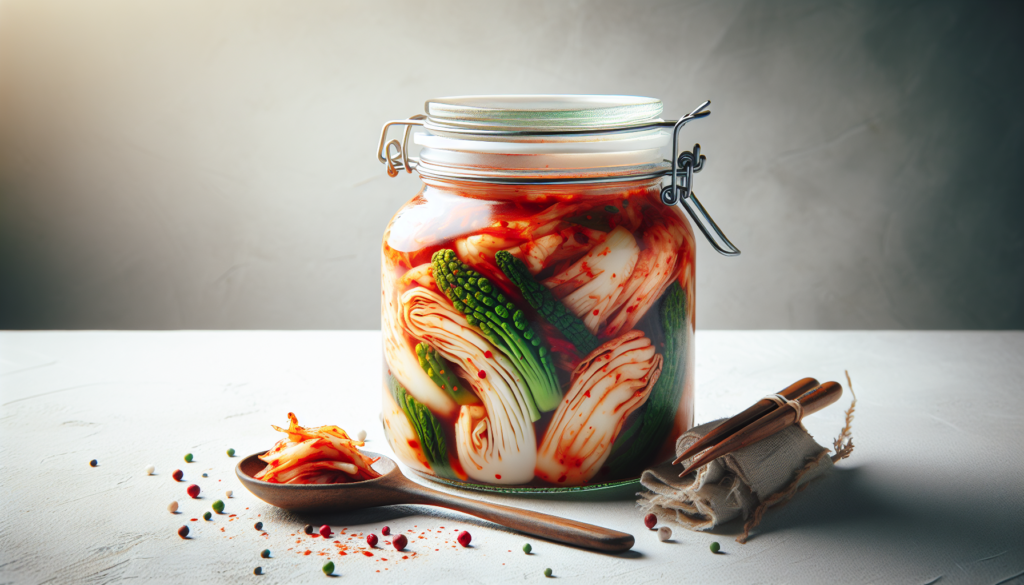As an inquisitive lover of Asian cuisine, it is probable that you’ve encountered and developed a fondness for the spicy, fermented delicacy that is Kimchi. Embraced in Korea for centuries and now infiltrating global epicurean scenes, the quest for finding the authentic and diverse blend of kimchi might be daunting. In the article, “Where To Buy Kimchi,” we outline contexts and markets – both digital and physical – that offer you authentic, quality Kimchi. Navigate through the maze of possible faux pas in your culinary exploration to ensure you have an enriched, genuine Kimchi experience.

Understanding Kimchi
The world of gastronomy is as diverse as the cultures it springs from, with certain dishes becoming synonymous with their place of origin. When speaking of Korean cuisine, one such iconic dish is Kimchi.
General Overview about Kimchi
Kimchi is a traditional Korean side dish made from salted and fermented vegetables, most commonly napa cabbage and Korean radishes, with a myriad of seasonings including chili powder, scallions, garlic, ginger, and jeotgal (salted seafood). Its taste is a unique combination of spicy, sour, and umami flavors.
Importance of Kimchi in Korean Cuisine
Kimchi is a cornerstone of Korean cuisine, an omnipresent feature on the table regardless of the main dish. Its significance stretches beyond its culinary importance. It boasts of numerous health benefits due to its rich probiotic content from the fermentation process. Its cultural significance is such that UNESCO inscribed “Kimjang,” the process of making and sharing kimchi, in its Representative List of the Intangible Cultural Heritage of Humanity.
Different Varieties of Kimchi
Far from being a one-note dish, Kimchi offers versatility with over 100 officially recognized varieties. These differ based on the main vegetable used, the combination of seasonings, and the fermentation process. Some of the popular varieties include Baechu Kimchi (made with napa cabbage), Kkakdugi (made with radish), and Yeolmu Kimchi (made with young radish).
Making Homemade Kimchi
If you’re keen on embracing the Korean culinary tradition, making homemade kimchi can be a rewarding experience.
How to Make Kimchi at Home
Making kimchi at home starts with selecting the freshest ingredients. The process involves salting the vegetables, making a flavor-packed paste, then rubbing it onto the vegetables before they are left to ferment.
Ingredients Needed for Homemade Kimchi
The main ingredient for kimchi is napa cabbage or radish. Other ingredients include coarse sea salt, Korean chili powder (gochugaru), fish sauce, garlic, ginger, and green onions. Some recipes might also include sugar, radish, onion, and fermented shrimp.
Steps in Preparing Kimchi
Preparing kimchi involves a multi-step process: chopping the vegetables, salting them and setting them aside, preparing a spice paste, then mixing the paste with the vegetables. Finally, the mixture is packed into a jar and left at room temperature to ferment for a couple of days before being refrigerated.
Physical Stores to Buy Kimchi
While homemade kimchi has its charm, the convenience of store-bought kimchi is undeniable. Let’s explore where to buy kimchi:
Asian Grocery Stores
Asian grocery stores, particularly those specializing in Korean goods, are your best bet for a wide range of both domestic and imported varieties of kimchi.
Supermarkets
Larger supermarket stores with extensive international sections might carry kimchi as well, but their selection may be more limited compared to specialized Asian grocery stores.

Buying Kimchi from Asian Grocery Stores
If you’re on the hunt, an Asian grocery store could be your savior.
Pros and Cons of Buying Kimchi from Asian Grocery Stores
The most obvious advantage of buying kimchi from an Asian grocery store is the variety. From mild to extra spicy, radish to cucumber kimchi, you’ll likely find a variety to please your palate. However, the downside could be that ingredients might be written in Korean, which could pose a challenge if you’re particular about food labels.
Popular Asian Grocery Chains that Sell Kimchi
Several Asian grocery chains around the world have a solid kimchi range, including H Mart, 99 Ranch Market, and Lotte Plaza.
Buying Kimchi from Supermarkets
Supermarkets are an easy and accessible option.
Pros and Cons of Buying Kimchi from Supermarkets
The pros of buying kimchi from supermarkets include ease of access and standardized food labeling. However, the cons could be a limited variety and possibly higher pricing for the same products found in an Asian grocery store.
Common Supermarket Chains that Sell Kimchi
Popular supermarket chains, such as Whole Foods, Walmart, and Cost Plus World Market, stock kimchi regularly.
Specialty Stores for Kimchi
For a more authentic experience, specialty Korean stores are ideal.
Finding Specialty Korean Stores
These niche stores are often located in or near Korean neighborhoods in major cities. They might not be as widespread as supermarkets, but they offer a wide variety of authentically Korean kimchi.
Advantages of Buying from Specialty Korean Stores
Buying from specialty Korean stores ensures you’re getting a product that adheres strictly to Korean culinary traditions. The varieties available will likely surpass those found in other stores, and the storekeepers may be able to provide guidance and recommendations.
Online Options for Buying Kimchi
If physical browsing isn’t for you, there are plenty of online options.
E-commerce Websites that Sell Kimchi
Numerous e-commerce websites, including general and speciality ones, offer kimchi in their product range.
Specialty Korean Online Stores
Several online stores focus specifically on Korean products, including a wide array of kimchi.
Buying Kimchi from E-commerce Websites
E-commerce platforms open up a world of possibilities.
Popular E-commerce Websites to Buy Kimchi
You can find kimchi on many popular e-commerce websites, including Amazon, eBay, and Walmart’s online platform.
Pros and Cons of Buying Kimchi Online
Buying kimchi online carries the convenience of shopping from your couch. It also offers the chance to access many brands and reviews. However, the downside includes shipping charges, delayed gratification due to delivery periods, and potentially receiving a product nearing its expiration date.
Buying Kimchi from Specialty Korean Online Stores
For the virtual Korean experience, specialty online Korean stores are your pick.
Pros and Cons of Buying Kimchi from Specialty Korean Online Stores
Specialty Korean online stores offer a vast selection of kimchi with the added benefit of descriptions and cultural insights into the varieties available. However, the downside might be higher shipping costs and longer delivery times due to potential international shipping.
Online Specialty Korean Stores to Consider
Korean online stores like Kmall24, Sempio, and Gochujar are good starting points for your kimchi quest.
Factors to Consider when Buying Kimchi
Choosing a kimchi isn’t as simple as grabbing the first jar off the shelf. Here are some factors to keep in mind:
Checking the Ingredients List for Quality
Aside from your taste preference, inspect the ingredients list. A quality kimchi will list real food items like cabbage, radish, garlic, and chili. Avoid brands that use artificial additives.
Considering the Price Point
Kimchi ranges in price from budget-friendly to gourmet-level pricing. Consider what you’re willing to spend without compromising on quality.
Evaluating the Shelf-Life
Kimchi is a fermented product, but it still has a shelf-life. Check the “best before” date to ensure maximum freshness. Also, remember that once opened, it must be stored in the refrigerator and consumed within a few weeks.
In conclusion, whether you prefer making your own kimchi, buying it from a physical store, or ordering it online, there are plenty of options to explore. So, go ahead and satisfy your kimchi cravings with a variant that suits your palate and lifestyle!

